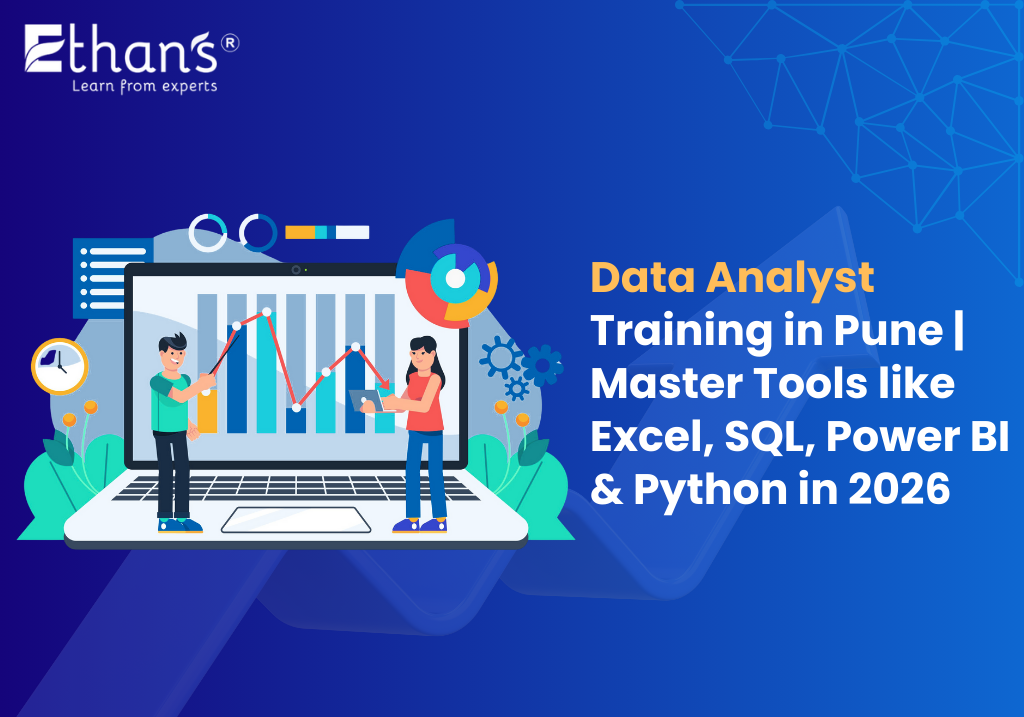About to finish your data analyst course in Pune a butterflies in the stomach – that’s common to appear for your first interview? A lot of excitement and somen.
They say cracking the first interview is often challenging. You don’t know what will happen during the session. Whether you will fall flat or rise!
We understand first interviews involve a significant amount of challenge.
However, confidence is the key to success. We help our students build it with the right tips provided and discussed through the numerous mock sessions we conduct.
Adhering to these tips helps them walk in confidently and step out happily. And they may help you as much as our students!
So, why wait? Let’s look at some crucial tips to prepare for a data analyst interview.
Tell Me Something About Yourself
OK. Something doesn’t mean anything. The interviewer doesn’t want to know about your first half-century in gully cricket or how you bunked your first lecture.
Focus on your data analysis journey, highlighting relevant skills and your projects. Do not forget to mention your passion for data and what proves it.
So, begin your current status, whether a recent graduate or a transitioning professional. Run through your educational background and relevant certifications.
After that, pivot to your interest in data analysis, specific skills in Excel, Python, etc., and the projects you’ve worked on and applied your skills.
Tailor your expertise to what matters the most to your prospective employer.
For instance, if they value SQL, emphasize your expertise in SQL.
Your Interest in Data Analysis
Candidates usually say it is a growing domain and that’s what interests them the most.
While that’s true, you shouldn’t confine your answer to it. Say it at the end if you want.
Before that, focus on points that excite you. These could include uncovering data patterns, solving problems, visualization, etc. Share an experience that made you realize data analysis is for you and that you must pursue it as a career.
Try to connect your answer with the company’s mission and the job description. However, do so naturally. Don’t let your answer sound fabricated or a deliberate attempt to impress!
Research the company’s needs, objectives, and the role it expects you to play. Frame answers that align with their needs to increase the chances of cracking the interview.
Your Strengths and Weaknesses
People usually begin with weaknesses in an attempt to display honesty and courage.
But that’s not necessary. Companies hire candidates for their strengths not weaknesses.
So, think strategically. Highlight your strengths relevant to data analysis and articulate weaknesses as areas of improvement and growth.
Strengths include problem-solving skills, analytical thinking, proficiency in tools, communication, etc. Support your answer with an example where your strength helped the project and drove positive outcomes.
On the other hand, while discussing weaknesses, choose a genuine one you are working on. For example, something like your proficiency in Python but you are enhancing your skill set and broadening your knowledge base through online courses can help.
Avoid overly rubbed answers like I am a perfectionist and similar ones.
Ensure your strengths are relevant to the job description and display self-awareness about your limitations, highlighting the steps you’ve been taking to overcome them.
Explain a Project You Worked on
Avoid vague or short answers. Interviewers want detailed ones, highlighting your process, your approach, and how you completed a particular project from start to finish.
Choose a project with clear goals, the tools you used, the challenges involved, and value.
Provide details about the project as to how you started, what challenges you identified, how you went about building the model, the processes you followed, and how you presented the insights. Don’t forget to highlight the value delivered. It matters the most!
Handling Missing or Dirty Data
You will never receive a perfect set of data in the real world. Thus, the interviewers would want to know how you will deal with imperfections and cut your way through it.
Answer this question, explaining processes like identifying the missing data, investigating the cause, handling missing data and dirty data, documenting, and your steps.
Display your understanding of the uniqueness of every problem and your abilities to provide a custom solution as a data analyst.
Stay Confident and Truthful
As said earlier, confidence is one of the keys to cracking the first interview.
You may be nervous from within. But you don’t have to necessarily show it or be vocal about it. Doing so may indicate you haven’t prepared enough.
And when it comes to data analysis, preparation is key! So, the interviewers may fail you in the very basic attributes of every data analyst.
Nonetheless, practice as much as possible. Posts like these and many others can help you understand the commonly asked data analyst interview questions and their answers.
Besides, be truthful.
Many candidates often cook up stories and fumble when the interviewer asks them questions. Remember, an experienced interviewer can quickly make out whether you are speaking the truth or lying. So, avoid the latter. Be genuine while sharing your experiences.
Explaining Technical Concepts to a Non-Technical Person
This is another area you must prepare for while preparing for a data analyst interview.
Often, data analysts must communicate their findings to non-technical stakeholders.
So, if the interviewer asks you to do it (which is very likely as it is a crucial skill), choose a concept you understand well. For example – correlation, specific algorithm, or regression.
Explain it with simple examples and analogies. Avoid jargon as they are confusing.
Focus on the what and why, instead of the how as the making process of a movie usually doesn’t interest audiences. They want to see the final product and enjoy it.
For example, while explaining correlation, you can explain the relation between dipping temperatures and woolen fabric sales. That’s a positive correlation.
Prepare for Technical Questions and Answers
The interviewers will ask you several technical questions. While the list is excessively long, some commonly asked questions include data wrangling, steps involved in an analytics project, understanding technical tools, EDA, data cleaning techniques, univariate, bivariate, and multivariate analysis, handling missing values in a dataset, and many others.
Prepare for as many as possible with comprehensive answers and simple examples wherever feasible. It will help the interviewer determine how well you understand the various concepts and aspects of data analytics.
Your Way of Approaching a Particular Business Problem
It is evident that businesses will come to you with specific problems when they look up to you as a data analyst. So, while preparing for technicalities, also frame your answer for this question that aims to assess your problem-solving skills and thought process.
Your answer should signify your approach and be broken down into logical steps, including understanding the problem, identifying relevant data, collecting and cleaning data, performing EDA, applying analytical techniques, drawing inferences, making recommendations, and communicating the findings.
A comprehensive data analyst course in Pune usually covers real-world projects requiring you to go through all the above steps. However, somehow, if you don’t have that opportunity, you can at least explain the steps in a structured manner.
Prepare and Ask Questions if Given a Chance
Interviewers usually give every candidate the opportunity to ask questions.
If you get it, ensure you ask sensible questions.
These can include the team you will be working with, the company’s culture, the types of projects you may be involved in, tools and technologies used, and opportunities for growth and development.
Avoid saying you don’t have any questions as that indicates a submissive approach. Ask too many questions and the interviewers may think of you as an over-smart individual.
Stay reasonable and rational. Ask what matters to you and your role.
Be Unstoppable with Confidence, Self-Trust, and Preparation!
Interviews are like an assessment of your skills. They are like selling your skills and the benefits of hiring you. So, ensure you highlight them and the value you would deliver.
Most importantly, practice your interview session with a data analytics expert so that you can prepare for as many questions as possible.
As Ethan’s Tech, interview preparation is an integral part of our data analytics course. Our experts conduct extensive rounds that build confidence and reduce fear.
That’s one reason, we’ve placed thousands of our students across numerous reputed companies in India and abroad. For more information and if you are searching for data analytics classes near me, call us at +91 95133 92223.





